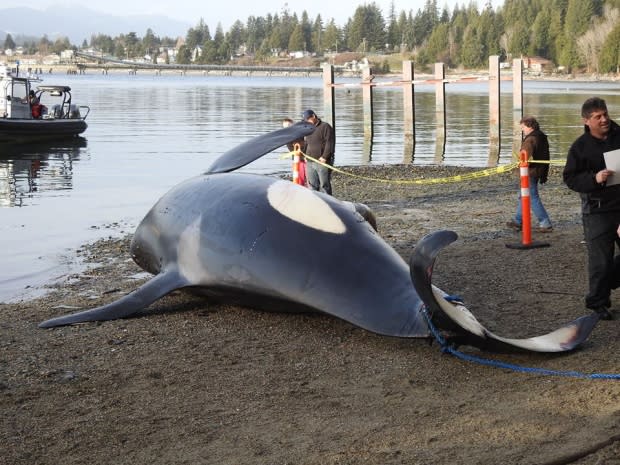Report confirms ship strike caused death of killer whale J34
The final report into the death of a southern resident killer whale over two and a half years ago confirms that it died from blunt force trauma, likely inflicted in a ship strike.
J34, an 18-year-old male nicknamed Doublestuff, was found dead near Sechelt on Dec. 20, 2016.
At the time of his discovery, Fisheries and Oceans Canada said initial examinations of the seven metre orca indicted that it was alive when struck and died sometime later.
J34's necropsy report was last updated on May, 23, 2017, however, according to a DFO spokesperson, the report wasn't made public and is only available upon request, as per policy.
CBC requested the report July 22.
"There were no requests for this information at the time the report was finalized. There had been significant media coverage at the time, reporting the cause of death was blunt force trauma, consistent with a ship or boat strike. The final report came to the same conclusion, " said DFO's Dan Bate.

Shari Tarantino of Orca Conservancy, a Washington state non-profit, said there is a lack of transparency around the DFO's reporting on J34.
According to Tarantino, her group and Washington state orca researcher Scott Veirs had been asking DFO for the final J34 necropsy report for months. Tarantino received a copy of the report late last week, but only after petitioning the office of Fisheries and Oceans Minister Jonathan Wilkinson directly.
"It should not have taken two and a half years to release a report," said Tarantino.
"There's nothing new in this report. It's basically what we had already been told. But it's hard not to wonder if it was withheld because Kinder Morgan or because of Roberts Bank Terminal 2 (the proposed container terminal in Delta, B.C.) was waiting on comments."
Fisheries and Oceans Canada media advisor Lara Sloan said the delays in sending the report were due to administrative problems and miscommunication within DFO.
"There was no intention not to provide that report," said Sloan.
The precarious state of the 76 remaining southern resident killer whales is a major concern in the Trans Mountain expansion project which will increase tanker traffic through the animals' territorial waters once completed.
A report released this year by the National Energy Board backed up those concerns, suggesting the project would have "significant adverse effects" on the whales.
The federal government approved the Trans Mountain expansion project last month.
Find out more about the future of the southern resident killer whales in a new CBC British Columbia podcast. The first episode of Killers: J Pod on the Brink, hosted by Gloria Macarenko, was released July 18. You can subscribe now wherever you get your podcasts.

